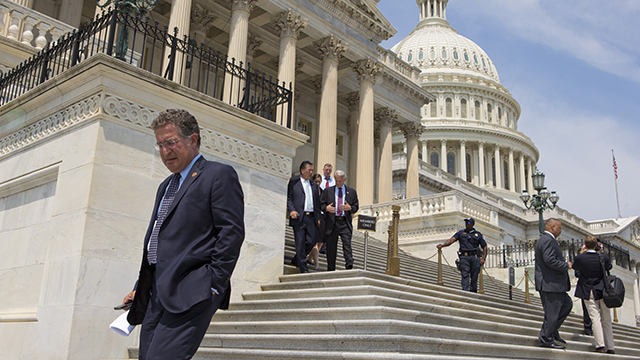This story was originally published by The Center for Public Integrity, which is a nonprofit, nonpartisan investigative news organization in Washington, DC.

After final vote were cast, members of Congress walk down the steps of the House of Representatives as they leave for a five-week recess, at the Capitol in Washington, Friday, Aug. 2, 2013. (AP Photo/J. Scott Applewhite)
Wealth inequality in the United States is pervasive — so much so that it’s apparent even in Congress.
The House and Senate have their own form of inequality within their ranks. Of the 534 current members, the 53 richest owned nearly 80 percent of the estimated wealth held by all federal lawmakers in 2014, a Center for Responsive Politics analysis shows. That concentration resembles the inequality that exists in the United States more broadly, where 76 percent of the country’s wealth is held by the top 10 percent of households.
Granted, no tears should be shed for those elected few. The median wealth for a member of Congress, about $1.1 million in 2014, still far outpaces that of the typical American family, worth about $56,355 in 2013 (a 2014 figure is not available). And no member of Congress can be said to live in poverty: Congressional salaries alone remain at $174,000 at the least, placing members firmly in the top 10 percent of American wage earners, with an enviable pension for those who stay in office for at least five years.
But a close look at members’ personal financial disclosure statements covering 2014 shows that Congress is a body of extremes — extreme wealth and a bit of extreme debt. Even though Congress may be a sample of particularly well-off Americans, its richest members are staggeringly wealthy — though none, so far, appear to be billionaires.
The top three: Rep. Darrell Issa (R-CA) again comes in at No. 1. We estimated his average net worth to be $437 million. That’s a little less than his 2013 net worth, but the fortune he made in the car alarm business is more than enough to keep him at the head of the pack. Rep. Jared Polis (D-CO) is next, with an average net worth of $388 million, and Sen. Mark Warner (D-VA) again posted the highest net worth among senators with nearly $243 million.
At the other end of the spectrum, we estimated Rep. David Valadao’s (R-CA) average net worth at negative $25 million, thanks to lines of credit he’s used to prop up his dairy business; he’s been at the bottom of the chart frequently, but his 2014 deficit is more than twice as much as that of the year before. In addition to Valadao, 20 more members showed more liabilities than assets when we calculated their average wealth, including Rep. Joaquin Castro (D-TX), who added two new liabilities — credit card debt and a loan — and saw the value of his assets decrease by $69,500 down to negative $61,500.
Castro and Valadao, though, were the exception to the rule. More than half of all members of Congress saw their average net worth increase in 2014, while the median net worth of Congress as a whole rose about 6.7 percent, from $1,029,505 in 2013 to $1,098,508 in 2014. That’s nearly three times more than it grew between 2012 and 2013, when Congress posted a 2.5 percent increase in its median net worth.
“It may be surprising to learn that there are disparities in wealth among members of Congress that are similar to the inequities in the wealth of the general population,” said CRP Executive Director Sheila Krumholz. “Still, lawmakers continue to be far more affluent than the people they represent, on average and that affluence grew at faster clip last year. The differences between the ultra rich and the merely rich among them doesn’t seem very likely to sensitize them to the plight of the average American.”
Despite the wide gap between the richest and poorest lawmakers, the growth wasn’t concentrated among the richest of the rich. The most well-off members of Congress — the top 10 percent in terms of reported wealth (from Issa on down to Connecticut’s Democratic Rep. Rosa DeLauro (D-CT), who has an average net worth of $15.2 million) — saw their net worth grow 4 percent. Among the top quarter, the growth rate for lawmakers’ wealth was 2.4 percent. While 17 members joined the ranks of the Hill’s $1,000,000 club between 2013 and 2014, 13 on 2013’s list dropped below a million-dollar net worth. That brought the number of millionaire lawmakers to 274.
(The values are estimated because lawmakers report the value of their assets and outside income in ranges, not exact figures. We calculate the highest possible value for each asset or liability as well as the lowest, then average the numbers. That said, the top range for lawmakers’ assets is “over $50 million” and for Senate spouses it’s simply “over $1 million,” making it impossible to calculate the highest value in those cases. It’s also important to note that these reports don’t include the value of personal residences unless they produce income or congressional salaries or pensions. For more information, see the detailed methodology we use to calculate lawmakers’ wealth.)
All the growth drove a slight increase in the estimated figure for total wealth held by Congress in 2014 — the sum of each member’s average net worth — to $4.4 billion, up from $4.3 billion in 2013. The uptick continued a trend the Center for Responsive Politics has tracked for years: The net worth of Congress rarely drops, with the exception of the year 2008.
Polis saw the biggest change in his assets in real terms: estimated growth of $171 million since 2013. Several of his major assets jumped up a range, so it’s unclear exactly by how much his wealth grew.
Castro saw the biggest plunge in his net worth and Valadao saw his drop 117 percent.
This year, the fortunes of Democrats and Republicans switched. Last year, it was Republicans whose members saw an increase in median net worth as a group, while Democrats saw their collective net worth drop. But in 2014, median net worth for Democrats went to $1.1 million, up from $946,511 in 2013; Republicans suffered a slight loss, from $1,107,017 million in 2013 to $1,093,279 in 2014.
Senators remained wealthier than House members. The median net worth of the Senate in 2014 stood at $2.9 million — up from $2.8 million in 2013 — while in the House, it was $860,005 in 2014. That was an increase, too: In 2013 the House posted a median net worth of $843,507.
Like Americans overall — whose total net worth peaked in 2014 at $82.9 trillion — many of lawmakers’ assets are stocks. At least 45 members held stock in some of the biggest, most recognizable corporate names in the US: General Electric, Apple Inc., Wells Fargo, Microsoft Corp., Procter & Gamble and JPMorgan Chase & Co. All together, members of Congress held between $718 million and $2.3 billion in the top four industries: the real estate, securities and investment, commercial bank and miscellaneous finance industries.
Senior Researcher Dan Auble and Researcher Alex Baumgart spearheaded CRP’s analysis of 2014 House and Senate personal financial disclosure statements, with help from the rest of the CRP staff.
Download the full list of all current members of Congress and the most popular congressional investments here.


